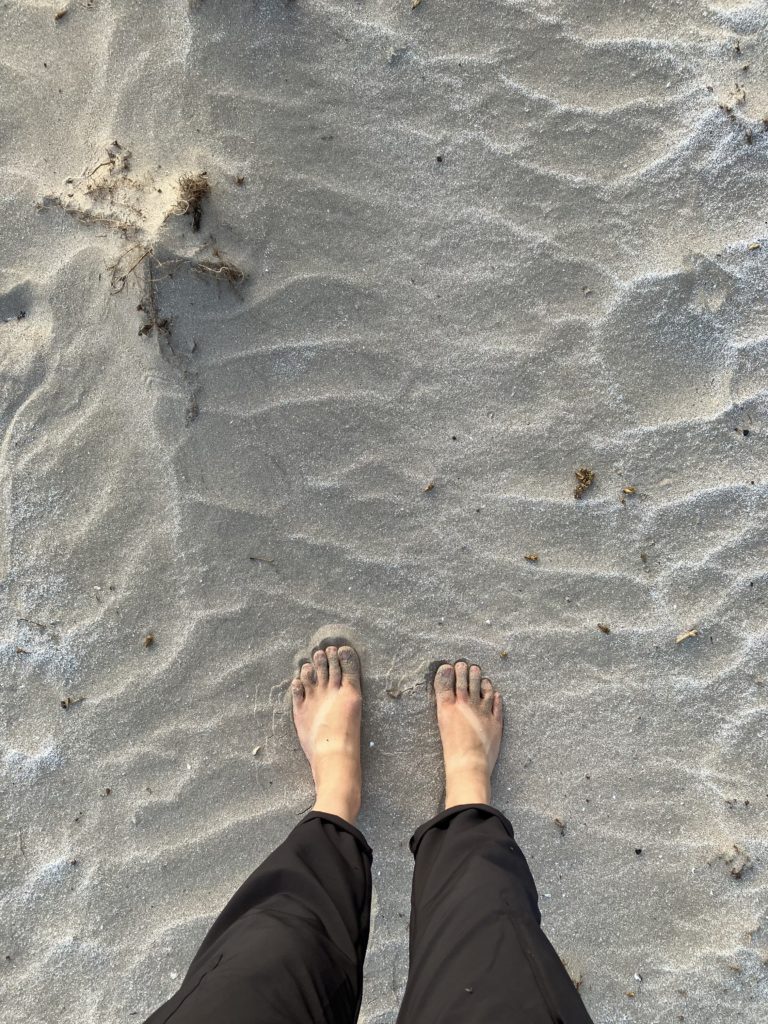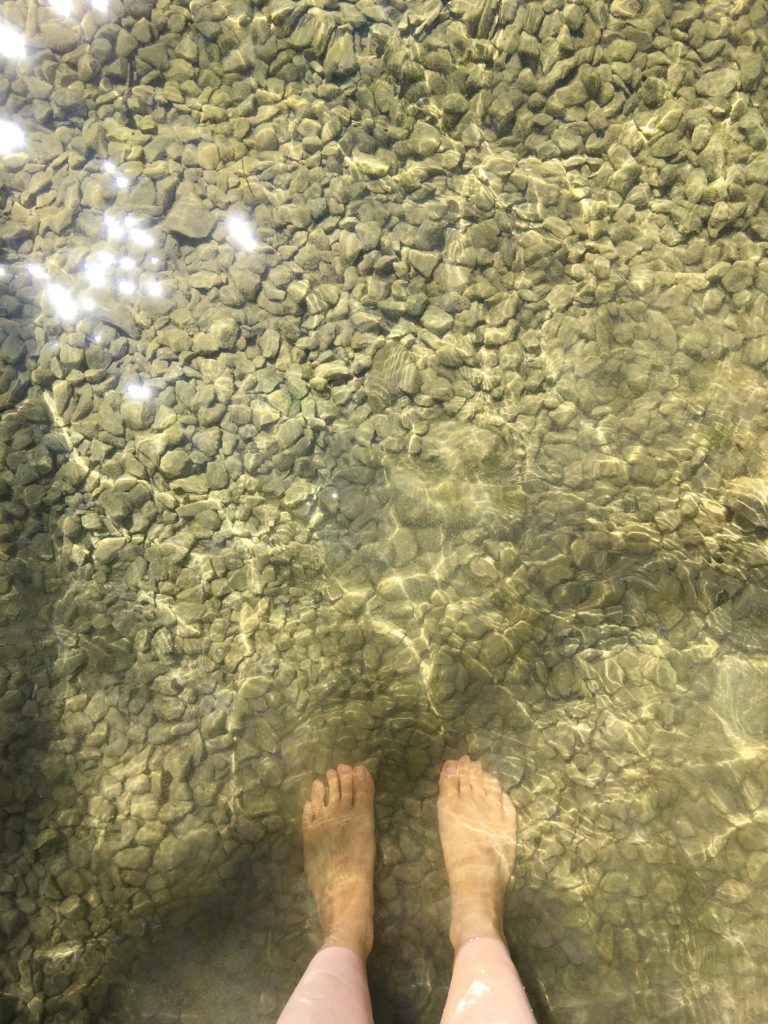Many of us in modern life have not had a proper sleep in years or even decades, which is absurd if you really think about it. When you sleep, not only do you recover from exercise but your body also heals itself from illness, undergoes cellular repair, reduces inflammation, increases metabolism, improves mood and emotional stability, strengthens the immune system, regulates blood pressure and modulates hormones, reduces cravings for non-foods, and repairs the brain, boosting cognitive function and mental health. Proper melatonin production (the body’s sleep hormone and central part of the sleep-wake cycle) also down regulates cancer genes! How cool is that? What’s more is that the better sleep you get consistently, the more effective these processes will be over time.
For many people, sleep is just sleep, but did you know that sleep is actually the crux of maintaining health? You can slurp on all of the green smoothies and bone broths and do all of the health supportive practices, but if your sleep is poor and circadian rhythm is not aligned with the rising and falling of the sun, none of it will work optimally for your goals. Your spirit and body will be more susceptible to suffering.
Your daily lifestyle decisions will be reflected in the quality of sleep that you get. You’ll know you’ve had a successfully restorative sleep when you wake up feeling refreshed and energised after a full night of uninterrupted sleep.
If you’ve found yourself struggling with getting a good night’s sleep, may this article help you on your way to getting the best sleep of your life.
Follow the Body: The Circadian Rhythm
Your body’s internal clock or circadian rhythm is a mirror of what is ideally the rising and falling of the sun, and many of your body’s systems are calibrated with the appearance and disappearance of natural light. Being excessively indoors all the time on screens with their isolated blue light as well as artificial light interferes with this vital connection and causes damage.
Your light environment and circadian rhythm are everything. Circadian biology is linked to your relative health homeostasis, whether psychiatric, neurological, physiological, or autoimmune, and its disruption is even implicated in all cancers. Circadian rhythm alignment is more important than even diet and nutrition when it comes to preventative and reparative medicine.
Your circadian rhythm orchestrates a hormonal release – notably in the secretion of cortisol (awake/alert hormone) and melatonin (sleepy hormone) in a highly complex dance, influenced by your lifestyle choices and factors such as sunlight exposure and temperature. To maximise the benefits of these intricate processes, you’ll want to tune into your body’s needs and live as close to nature as possible, with DIRECT sunlight (including sunrise, morning light, cloudy, snowy and rainy seasons, and sunset) exposure onto bare skin and reflected into eyes (this means no sunglasses or contact lenses, and remove any prescription glasses unless needed for activities like driving), and minimal use of artificial indoor air conditioning, exposing yourself to the natural elements and seasons while reaping the benefits of hormesis.
Western and over-developed societies tend to be highly static and built “separate” from nature, with stagnant lifestyles boxed indoors, staring at screens all day with toxic, carcinogenic isolated blue light which interferes heavily with this complex dance of sleep/wake hormones. Know that you *are* nature, and go outdoors as much as humanly possible to inform your body and its healing processes. Take your work outside on a laptop if you must, in order to mitigate some of the deleterious effects of indoor isolated blue light. Opt for reading paper books by candlelight or salt rock lamp light at night, which doesn’t suppress melatonin levels like screen exposure does.
This exposure to the earth’s natural rhythms will allow for optimal secretion of cortisol and melatonin throughout the day, and ensure that you get restful sleep, waking up feeling like you’re on top of the world, and bursting with clarity and energy (…without any need for caffeine).
Don’t be afraid to go for it alone, when you partake in these practices it helps to remember you are a part of the intricate web of humans and other beings around the earth on similar paths who can support you.
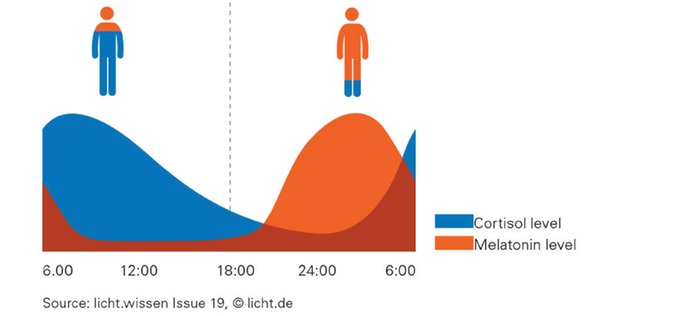
Here are a few tips you can consider when it comes to allowing yourself the best sleep of your life.
1. Watch the sunrise and expose your eyes to daylight.
Light shapes life. Getting early natural morning light from 8-10 AM directly into your retinas is one of the most beneficial things you can do to boost your mitochondria and set your circadian rhythm (this means no sunglasses or contact/cataract lenses, or windows that block part of the full light spectrum, and remove any prescription glasses, which I do whenever possible – these all block the full light spectrum, so take them off outside).
Watch the sunrise, sky and/or your surroundings outdoors every single day (around 6-8 am), or go for a walk and take off your glasses. You can even set an alarm to wake yourself up and go back to sleep after you’ve watched the recommended 15-30 minutes (minimum) of sunrise, then you’ll eventually adjust to this natural rhythm and begin to wake up naturally. Getting sunlight on the eyes shortly after waking triggers a neural circuit that controls the timing of cortisol and melatonin, affecting sleep.
After sunrise, get out from 8-10 am and expose your eyes to the light again. It helps to make it a task, like watering your garden, enjoying your meal, or taking a barefoot walk. Expose a large portion of your bare skin as well, if you’re up to it (in the summer I like wearing an open back tank top – even sunlight on just the back of your neck will help). If you get any sunlight at all, let it at LEAST be morning sunlight, the safest kind of sunlight.
Get out again at around midday and expose as much of your bare skin to the sunlight as possible (when starting out, only about 10-15 minutes to tolerance, with no sunscreen, makeup, or skincare). Bonus points for unbridled nudity and beach swims. Just make sure you don’t burn.
Get out again at sunset to slow down and prepare your body for winding down for the day (sunset walks that improve digestion after dinner, what’s up). Simply turn off all electronics, screens and artificial lighting at sunset, and expose yourself to red light/amber bulbs/light from fire or candles only, after the sun sets.

Obviously you wouldn’t want to stare directly at the sun aside from the 1 safe hour surrounding sunrise and sunset, but at the very least you should be getting the rays bouncing off of everyday objects into your retinas by simply going outside of any buildings and taking off your prescription eyeglasses, even for a few minutes, consistently throughout your life. Look at the brighter parts of the sky to get in all that light information. Follow the sun. When it goes up, rise. When it goes down, rest.
Another brilliant way to inform your suprachiasmatic nucleus is to eat whole foods, grown or caught locally, which will connect you to the part of the earth that you’re located in profound ways. For best results, aim to always eat during daylight hours, before sunset, especially around noon when your digestive fire is high.
Those who do not move,
do not notice their chains.
R. Luxemburg
2. Ditch the artificial light, including (and especially) from screens and electronics.
…especially at night. This one is incredibly important. Artificial light, especially on the blue spectrum while isolated and indoors (hello, tech screens), suppresses the body’s natural melatonin (anti-cancer and much more) production, interferes with your circadian rhythm, and decreases your body’s ability to get quality sleep.
Artificial light at night is poison.
Artificial light sources trick your body into thinking it’s daytime and keep you awake, placing strain on your body’s regular recovery processes. Exposure to artificial sources of light past sunset can suppress melatonin up to 80%. Melatonin is our main repair hormone when we sleep, and its job is to clean house via autophagy and apoptosis. Blue light and artificial light exposure (tv, screens, lamps) past sunset destroys this process.
Striking a balance between the conveniences of modern technology and aliveness of primal living is genuinely an art, and to maintain your homeostasis/regenerative potential you’ll want to integrate outdoor primal living as much as humanly possible to balance it all out and reduce the pathways to many ailments such as stagnation, cancer and autoimmunity.
To get more specific, artificial light and nnEMF (non-native electromagnetic field) exposure dysregulates GABA/glutamate (and more) via their impact on voltage gated calcium channels (VGCCs). The body’s exposure to the artificial incomplete light spectrum, especially indoors, also takes its toll on things like dopamine, leptin, opsins, cortisol/melatonin, glucose metabolism, hormones including thyroid hormones, cellular hydration, and mitochondria. What’s more is that most modern scientific studies are done under artificial blue light around nnEMFs, so it is important to zoom out and think critically when it comes to exploring studies that support your theories/practices.
If you work on a laptop, bring it outside of any buildings so that you receive and complete the full light spectrum throughout the day (even working in the shade is fine and recommended, you will still receive the full light spectrum and mitigate the effects of indoor isolated blue light). If you work in an office, request to work remotely so you can take your setup outdoors away from carcinogenic fluorescent lighting, pesticide sprayed coffee, and harmful cleaners, perfumes and colognes. See my post on sunlight, and my other post on a DIY outdoor remote work office.
Avoid having your laptop on or too close to your body, and avoid using your technology after sunset without blue light blocking glasses (if at all). nnEMFs, including those from cell towers, cause hyper-calcium glutamate activation, so I also like to regularly consume grass fed and finished animal fats and drink/transdermally spray multiple forms of magnesium diluted in wild spring water as a primary protection from the harmful effects of nnEMFs, whether working remotely or in an office setting (see my post on magnesium). Wearing orgonite or shungite pendants will only barely help, but can also be utilised for additional peace of mind.
When the sun sets, aim to avoid all sources of artificial light as much as possible—especially 1 hour before your actual bedtime. The invention of the lightbulb and advent of industrial and artificial lighting has had catastrophic consequences on public health, with overly bright streetlights, bright car headlights, Christmas lights, and devices turned on 24/7 that not only interrupt our REQUIREMENT for a proper sleep/wake cycle, but also interrupt the migratory patterns and lifeways of birds and other wildlife. Avoid watching TV or excessively using your phone or other devices past sunset. Set a timer to turn off the wi-fi every night or when not using it. Use airplane mode on your phone whenever you’re not making a call/text. Get used to your own thoughts 😉
Safer forms of indoor/outdoor lighting past sunset include:
- Natural flame beeswax candles (which are a source of natural infrared light and also detoxify indoor air). Beeswax candles are excellent around the colder months!
- A big outdoor bonfire
- Salt rock lamps (the artificial light gets diffused into less abrasive light, but avoid using in humid climates as the rock becomes hydroscopic and may explode!)
- Amber/red coloured lightbulbs as a “night light” if needed.
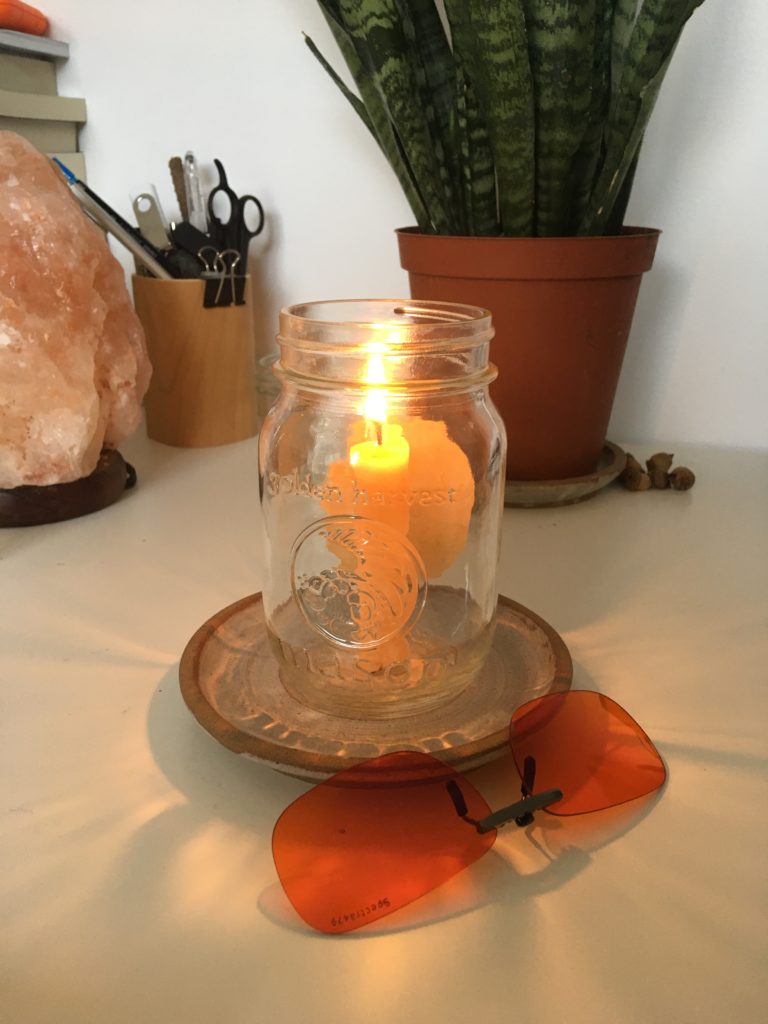
The Western/industrialized patriarchal life patterns that promote being “on” and “go-go-go” all the time have also had detrimental effects on female hormone balance and connection to our bodies. Remember to allow yourself deep rest and nutrition, and align your nature closer with the cycles of nature.
3. Use f.lux or another amber tinted app on your devices.
If you use electronic devices such as a laptop or desktop computer, install an app such as f.lux or Iris which controls the amount of blue light and abrasive brightness emitted from your screen throughout the day and gives the screen an amber tint past sunset in your location to make the light less abrasive. Simply using the “dimmed” screen light setting will still emit powerfully blue light, and will not mitigate the harm like the apps will! To be extra vigilant, I use my blue light blocking glasses along with f.lux on “dark mode” 24/7 if using my computer at any time of day (unless I’m editing photos or designing during the day, which requires colour accuracy). While using devices, I also try to cover my thyroid and wear long sleeved shirts to reduce skin exposure to blue light, which depletes DHA (sunlight photoreceptors) from the skin.
Using a tinted setting on my phone along with blue light blockers after sunset really helps me sleep so much better. If you’re on iPhone: go to settings > accessibility > display & text size > colour filters > turn on > choose colour tint > put intensity to full/near full.
Then, set a shortcut to allow you to easily triple click your home button to turn the red filter on and off as needed. Go to accessibility > accessibility shortcuts > colour filter. You’ll feel an instant relief when it’s on past sunset!
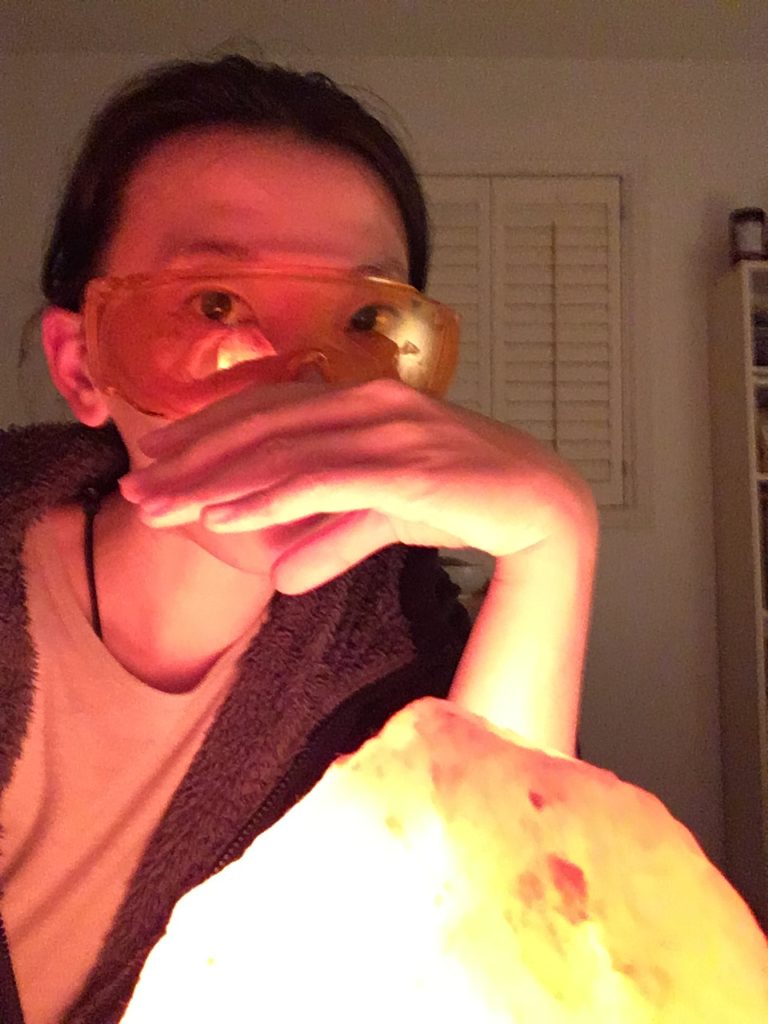
4. Pick an hour for bedtime, and stick to it indefinitely.
Melatonin, the “sleepy hormone”, peaks at 9-10 pm, so any time around there would be excellent for building sleep quality, especially if you tend to have trouble sleeping early like myself due to lifestyle. Pick an hour, and stick with it – your circadian rhythm, internal clock and hormonal responses require consistency and dedication to develop a truly healthy rhythm, and sorry, but having a consistent routine 5 days a week and partying on the weekend until 3 am just doesn’t cut it. You *will* experience the effects on the coming Monday.
Even a single disruptor will throw off your sleep cycle, such as a glass of wine before bed, watching a movie, working on your laptop past sunset, or a night out in the city. If you’re truly serious about creating an optimal sleep cycle (and this affects all of your bodily processes), practice consistency.
5. Don’t exercise too close to bedtime.
Exercising too close to bedtime will decrease the deepness of the sleep that you’d get. Melatonin and cortisol work opposite to one another, so when you work out when your melatonin is more active and your body is actually preparing for sleep, you end up forcing more cortisol and disrupting this process through exercising. Try to keep high cortisol activities for earlier in the day, which will improve your sleep, or try a more calming method of movement such as a restorative Yin yoga class in the evening, a few hours before bedtime. A lot of Westerners tend to go too hard all the time which sets us up for imbalances and depletion on a deep level.
6. Sleep in complete darkness.
Even the smallest light such as the ones that light up on a battery charger, or from streetlights seeping through your curtains, will disrupt your melatonin secretion and deep sleep. Ensure there is absolutely no source of light in your bedroom, or any leaking in from outside your bedroom, door cracks, or windows when you sleep. If you cannot control the light coming in from outside your room, opt for a sleep mask that will ensure pure darkness as you sleep. You could also invest in blackout curtains such as these. For optimal cellular recovery, you’ll want to live as if you’re in a cave in prehistoric times, before the invention of artificial light.
A study even showed that when a single photon of light that was shone on the back of the knee in an otherwise completely blacked out room would raise cortisol levels!
Click here for the natural silk sleep mask by B Yoga (I personally use and enjoy this as it’s minimally dyed and I barely feel it when I wear it, natural silk is an excellent material, ideally when non-toxic plant-dyed). This one is a decent option, also silk.
Black-out curtains are also a great investment to prevent any outdoor light pollution from seeping into your room.
7. Keep all electronics outside your bedroom.
Now more than ever, it’s so easy to get carried away when it comes to screen usage, especially when faced with an increasingly disconnected and isolated world. Despite this, it is incredibly important to resist the temptation to scroll endlessly throughout the evening. TVs do not belong in any bedroom, but you’ll also want to either move or unplug any computers, power bars, lamps, etc. in the room you’re sleeping in. A bonus is that your dreams may become more vivid without the interference of nnEMFs. Keep your phone on airplane mode and at the farthest point away from where you sleep.
You may also want to consider installing a Wi-Fi timer that switches off at a certain time so that you can sleep in true peace without the constant nnEMF interference on your cells, disrupting your sleep. Modern technology contains great power, it is vital to take the personal responsibility to learn to use it wisely.
8. Make your bedroom a sanctuary.
Having a dedicated space that feels energetically relaxed and calming will do wonders for your sleep quality. Take some time to make your space feel special and arrange it in a way that makes you feel calm and restful when you walk into the room. Burning some sustainably home grown white sage/common sage/mugwort/lavender, incense, or diffusing pure sage essential oil can also clear and cleanse the energy in the space. You could also go smokeless and use bells or chimes (wooden chimes are great) to cleanse the space through sound.
9. Don’t eat too close to bedtime.
Going to bed on a relatively empty stomach enables the body to heal and repair most effectively through a process called autophagy. This is probably common practice for a lot of people already, but eating too close to bedtime (~3 hours or less) is not a good idea. If your body is focusing on digesting a late dinner, it cannot focus on cellular repair.
This may be difficult for you if you do not control your blood sugar throughout the day, and you may have a harder time falling asleep on an empty stomach.
10. Control your blood sugar throughout the day.
When you manage your blood sugar, your body learns to use fat as fuel when the glucose runs out, and you’ll have more of a chance to wake up truly rejuvenated, light, and refreshed. This is one reason why I’ve developed such an affinity with what you could consider “paleo”/”keto”/”primal” styles of cooking (though I don’t like to identify with a limiting, boring box, and prefer to use my intuition to feel out what I’m craving on any given day).
11. Cut the caffeine.
*gasps from the audience* I’m totally serious: since the half life of caffeine is 5-6 hours, caffeine will be in your system at bedtime even if you have your cup in the morning. To find the time it takes for the caffeine to completely leave your body, multiply that number by 6 – it takes on average 36 hours for caffeine to totally clear the system. Not so great news for chronic coffee drinkers…
Remember that coffee is today’s most normalized psychoactive drug. If you absolutely must have your coffee, opt for Swiss water process decaf organic or ceremonial matcha for more gentle alertness, and have your cup before midday/noon, or at least 12 hours before you go to bed (go for Swiss water process because other decaf methods are highly toxic). Do it because you enjoy the taste, not because you’re tired.
It’s also a good idea to ditch alcohol, smoking, processed foods, refined sucrose, and other similar substances as much as you can. Your body *wants* to be tired at night, and *wants* to wake up feeling refreshed and energized, so if you are propping yourself up unsustainably with stimulants such as caffeine during the day, you are tricking your body into thinking you have energy. Ask yourself why you’re tired in the first place, and begin to address these factors before going willy nilly with stimulants and depressants that really act as a mask disconnecting yourself from the real you.
Energy drinks and other caffeinated substances were never in the picture for me, but I have personally tapered and weaned off of (even organic) caffeinated coffee for good in the spring of 2021.
12. Develop a bedtime ritual.
When you have a sense of routine, even if it’s vague, it will help your body stay cyclical and prepare for bed consistently. Go to bed at the same time 7 days a week, and cultivating the art of a deep sleep will come more naturally. After dinner which is always before sunset, I like to make a cup of herbal (non-caffeinated) tea and enjoy it as my day winds down, and often spray magnesium onto myself, or stir magnesium or grass fed collagen peptides in with my tea. Then I brush my teeth!
13. Tape your mouth shut.
Seemingly weird practice, but I hear it’s one of the most effective sleep hacks. Nose breathing 24/7 including during sleep is an optimal way to breathe. Using micro-pore tape is best, as it is gentle but strong enough to keep the mouth closed all night. Nose breathing helps you activate your parasympathetic nervous system (relax mode), allows for a deeper sleep, prevents snoring, promotes dental and overall health, and less asthma and allergies. When you breathe through the nose, your body generates 25% of its nitric oxide which enhances memory and learning, regulates blood pressure, reduces inflammation, and improves sleep quality, endurance, strength, and immune function.
Personally I find that I nose breathe effortlessly 24/7 and sometimes I find that even if I end up opening my mouth when I sleep, the back of my tongue is always sealed to the roof of my mouth and I nose breathe anyway! Go figure.
14. Magnesium.
Magnesium is a powerful mineral that can do wonders for sleep quality. It reduces cortisol and relaxes your muscles. In general, magnesium must ideally be repleted on a daily basis as a preventative approach to mitochondrial dysfunction. It benefits all areas of your body and mind, is critical for bone health, and you can use it as much as it benefits you, as one nutrient with many downstream effects.
High concentrations of magnesium intake or transdermal spray is your primary protection against the hyper-calcium glutamate activation from nnEMFs and cell towers in today’s highly inflammatory environment, this includes tech devices, Bluetooth, and wi-fi. Authentic orgonite and shungite may provide additional protection for peace of mind, though there have been no studies on these. I personally use an orgonite pendant and carry a shungite stone in my pocket when going out, and place orgonite pucks/pyramids around my room and tech devices.
- As a supplement: Stir some in a glass of spring water, and drink your desired amount of magnesium 1-2 hours before bed as you’re winding down.
- Transdermally: use a topical spray liberally on bare skin, or apply topical magnesium oil or gel to bare skin. Ancient Minerals is a brand I like.
- Warm Epsom bath: also transdermal, and you get the extra added benefits of heat shock protein activation.
Click here for my full magnesium article that includes an easy homemade transdermal magnesium spray recipe.
Note: while we’re on the topic of supplements, melatonin is definitely a hormone you want near bedtime, but avoid taking long term exogenous (pill) supplements of melatonin as your body will assume it no longer has to produce its own endogenous melatonin over time, and will eventually down regulate this function. You could develop an unsustainable dependency on the synthetic melatonin, and lose yourself down the road of mindless pill popping. Exogenous melatonin can be helpful when addressing things like jet lag, but is not a viable long term solution.
15. Pure organic/wildcrafted essential oils.
I’m personally not really into essential oils as they can be quite strong, but if they’re your kind of thing, you can add a few drops into a bath, diffuser, or in the palms of your hands while you bring your hands to your face and take deep inhales. Since they’re extremely powerful and easy to overdo, dilute them with a carrier oil such as jojoba oil or coconut oil – even if adding them to a bath.
Some of my favourite scents include:
- Lavender
- Sage
- Pine
- Peppermint
- Eucalyptus
- Tea tree
- Rose
- Frankincense
- Ylang ylang
16. Get grounded.
Connect to our mother! The Earth is abundant in negatively charged free electrons (Schumann Resonance), and connecting by walking barefoot outdoors helps calibrate our circadian rhythm and balance hormonal cycles, reduce inflammation, decrease muscle tension and stress, and promote healing. We feel “at home”, fully present, and connected.
In Western and overdeveloped societies it’s so easy to be completely disconnected due to the pavement, plastic carpeting, narrow rubber soled shoes that harm feet, and inflammatory indoor environments, but similar to forest bathing (shinrin-yoku), earthing will offset so much of it. Place your bare feet on the bare planet as much as humanly possible, and your body can balance out its electric potential while experiencing the elements—the results are profound with even just 5-10 minutes of skin-to-skin contact with Mama Earth, along with the full energy circuit between earth, sun and sky. Personally, I immediately feel the difference especially after spending a large amount of time indoors, bombarded with neighbours’ nnEMFs. There’s a lot of fascinating science on this, so go explore!
Best surfaces for earthing include:
- grass (pesticide free)
- dirt & soil
- sea & sand (beach runs, anyone?)
- lakes, rivers, streams, creeks (be safe with this!)
- the ocean (probably the best location as the minerals and moisture both enhance conductivity)
- natural rock and stone, such as slate, sandstone, limestone, granite, as long as it’s in direct contact with the Earth
- concrete that is unsealed and untreated (not painted) and is not insulated from the Earth also has some degree of conductivity that increases when it’s wet
Simply stand, walk, or lay down on these surfaces! You will clear your mind, recharge energy, release tension, strengthen your primal instincts, and calm your emotions. After spending many years pretty much non-stop insulated from this contact, I genuinely feel like a whole new person.
When working outside on my laptop, I like to sit in the shade so that I still receive the full light spectrum, and directly sit/crouch on grass or uncoated concrete/rocks, no shoes or polyester clothing in the way. I also ensure to build my solar skin callus each spring consistently in the morning light to ensure resilience and reduce risk of burning later in the day and in the summer months. If it is a hot day and the patio rocks/concrete are too hot, I wear Earth Runners or traditional leather moccasins without a rubber sole to keep my feet from burning while staying grounded.
After an airplane flight, it especially helps to reground yourself by spending some time barefoot in your new location, balancing out the inflammatory effects of the airport/airplane nnEMFs and calibrating your circadian rhythm. If you travel to a new place wearing your rubber insulated shoes the whole time, can you really say you’ve been there?
In the event that actually going barefoot may not be practical, such as mixed terrain or possible pesticide runoff, Earth Runners are my favourite barefoot sandal. They’re built with a copper plug on the sole which conducts these negative ions onto the shoe straps so you still get the full benefits of barefoot even with the rubber Vibram soles—not to mention that they’re really well made and don’t slip off. You’ll experience the proprioceptive advantage. Click here for more info on Earth Runners.
17. Inner peace.
Inner peace is fundamental and my definition of wealth, and cultivating a practice of forgiveness and gratitude with healthy boundaries can take you so far – not only in all aspects of your life, but also when it comes to cultivating the art of a restful sleep in a positive feedback loop.
Make it a ritual before bedtime to give some thanks for all that went right that day, your food, water and shelter, heartbeat, potential – everything. Trying to forgive everyone who has “wronged” us and letting go of the things that hold us back and consume our energy creates a miraculous and powerful shift, and allows us to sleep peacefully at night. If you have time, write down a list of things you’re thankful for, and consciously forgive *everyone*, letting go of any resentment (they were likely doing the best they could with the information they had at the time—and even if not, do it for yourself). You’ll wake up in a positive headspace with more of your sovereign life energy reclaimed, ready to seize the day.
Hopefully, these tips for the best sleep of your life will help you in some way to create more balance! Remember that you are in the driver’s seat of your life. Observe, learn, play… use your intuition, follow your inner voice.
Videos:
Articles:
https://jackkruse.com/emf-1-does-your-rolex-work/
Children in Sweden (and other Nordic countries) regularly sleep outside to boost immune system (I saw this a lot in Iceland where people would casually leave out their baby carriages in front of shops and cafes!)
Essential oils for anxiety – Healthline
https://www.alexfergus.com/pages/sleep-resources
Light and the circadian rhythm: The key to a good night’s sleep?
https://www.cdc.gov/niosh/emres/longhourstraining/light.html
https://jackkruse.com/brain-gut-11-is-technology-your-achilles-heel/
https://jackkruse.com/cold-thermogenesis-7/
https://bengreenfieldfitness.com/article/sleep-articles/get-better-sleep/
https://www.health.harvard.edu/staying-healthy/blue-light-has-a-dark-side
https://www.healthline.com/health/light-for-sleep
https://www.healthline.com/health/grounding
https://themodelhealthshow.com/fat-loss-mistake-working-out-at-night/
https://www.news-medical.net/health/Artificial-Light-Exposure-and-Circadian-Rhythm.aspx
https://www.health.harvard.edu/diseases-and-conditions/benefits-of-moderate-sun-exposure
Books:
Close Your Mouth: Buteyko Clinic Handbook by Patrick McKeown
The 8-Hour Sleep Paradox: how we are sleeping our way to fatigue, disease and unhappiness by Dr. Mark Burhenne (askthedentist.com)
The Circadian Code by Satchin Panda, PhD
Breath: the New Science of a Lost Art by James Nestor
Research:
Having a natural circadian rhythm protects the liver
Circadian disruption in cancer
Genomics of circadian rhythms in health and disease
Sirtuins and the circadian clock: Bridging chromatin and metabolism [study]
Circadian regulation of mitochondrial uncoupling and lifespan
https://www.ncbi.nlm.nih.gov/pmc/articles/PMC2248601/
https://www.ncbi.nlm.nih.gov/pmc/articles/PMC5447688/
https://www.ncbi.nlm.nih.gov/pmc/articles/PMC5388543/
https://www.pnas.org/content/118/39/e2101591118
https://www.pnas.org/content/118/22/e2100094118
https://www.ncbi.nlm.nih.gov/pmc/articles/PMC4375362/
https://www.ncbi.nlm.nih.gov/pmc/articles/PMC2717723/
https://www.ncbi.nlm.nih.gov/pmc/articles/PMC2831986/
https://www.ncbi.nlm.nih.gov/pmc/articles/PMC4734149/
https://journals.plos.org/plosbiology/article?id=10.1371/journal.pbio.1000145
https://www.ncbi.nlm.nih.gov/pmc/articles/PMC6751071/
https://pubmed.ncbi.nlm.nih.gov/24920214/
https://www.sciencedirect.com/science/article/abs/pii/053155659190015E
https://www.jimmunol.org/content/158/9/4454.short
https://pubmed.ncbi.nlm.nih.gov/3033008/
https://academic.oup.com/ajcn/article/80/6/1678S/4690512
https://www.jidonline.org/article/S0022-202X(15)36878-0/fulltext
https://www.ncbi.nlm.nih.gov/pmc/articles/PMC2290997/
https://www.nejm.org/doi/full/10.1056/NEJM199501053320102
https://academic.oup.com/jcem/article/85/10/3597/2852263
https://onlinelibrary.wiley.com/doi/full/10.1002/jbio.201900102



